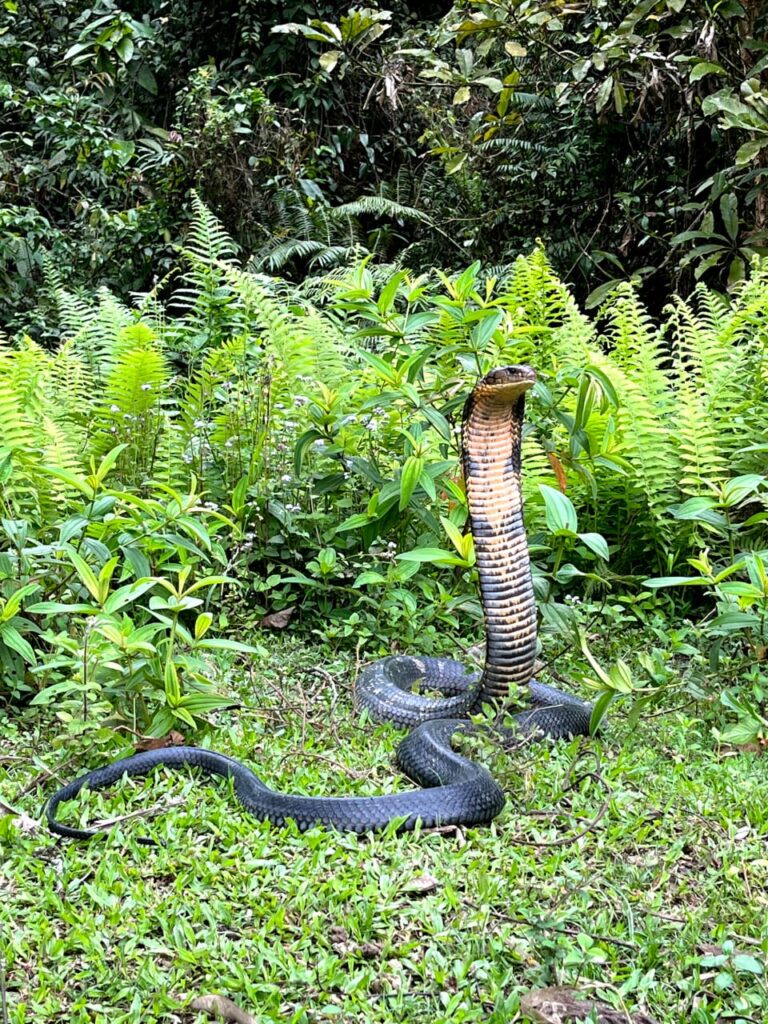By Avik Chakraborty
Dibrugarh: “Within a week I’ve got five calls to rescue King Cobras from their houses. Along with my team, we rescued three king cobra and released them into wild,” said Devojit Moran, an environmentalist.
Moran, a passionate snake catcher met nature lovers like Trinayan Gogoi, Kartik Choudhury and Anupam Sharma in 2012 and decided to launch an environmental NGO. It basically works for awareness and rescue of animals. After that “Green Bud Society” was formed and they started their work.

Pic credit: Anupam Sharma
“Due to massive deforestation, the King Cobra is facing habitat loss and are coming out from forest and taking refuge in human settlements. Now, everyday people are calling us and telling that King Cobra has entered in their houses. Please come and rescue the snake. This week, I’ve got five calls from Tinsukia district to rescue King cobras,” said Moran, who is also the secretary of Green Bud Society.
He further said, “Our team have rescued a 12-feet King Cobra from kakopathar area. Two others King Cobras were rescued from Lakhipathar area and both of them were successfully released into wild,”.
The King Cobra (Ophiophagus hannah) is a venomous snake endemic to Asia. With an average length of 3.18 to 4 m (10.4 to 13.1 ft) and maximum record of 5.85 m (19.2 ft), it is the world’s longest species, varies across habitat, from black with white stripes to unbroken brownish grey.
“On Friday, we have rescued the third King Cobra from Kophohuwa, Lakhipathar area. It was a 10-feet King Cobra taking refuge at the backyard of the house. Among them, we have rescued a 12-feet King Cobra from the resident of Jalia Kisan of Kakopathar, Neemaijan. In similar way, the King Cobra was found in the backyard of his house. After many hours, we have rescued the 12-feet King Cobra,” Moran added.
He further added, “The villagers told us that they have not seen such a big snake in their area. Our team have explained them that due to habitat lost the snakes are entering human habitation to take refuge and sometimes they are coming after the prey,”.

The King Cobra in India is placed under Schedule II of Wildlife Protection Act, 1972. Killing of King Cobra is punished with imprisonment of up to six years
“The King Cobra used to stay in Bamboo trees and in dense forest. The most venomous snake of the world are facing habit loss due to rampant deforestation. Their habitat has been destroyed by the industrial process,” he said.
The King cobra has a wild distribution in South and Southeast Asia. It occurs up to an elevation of 2,000 m (6,600 ft) from the Terai in India and southern Nepal to the Brahmaputra River basin in Bhutan and northeast India, Bangladesh and to Myanmar, southern China, Cambodia, Thailand, Laos, Vietnam, Malaysia, Singapore, Indonesia and the Philippines.






No comments: